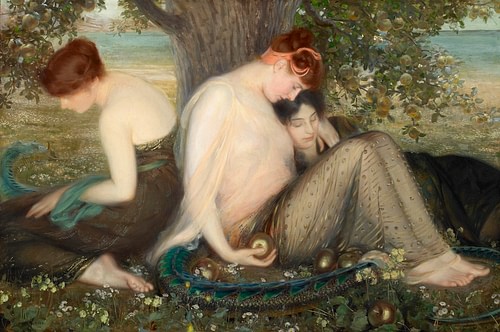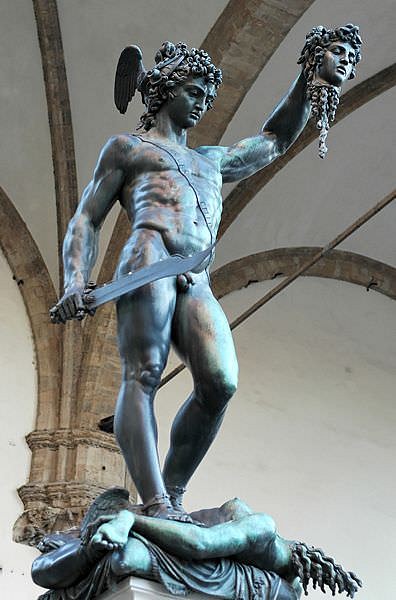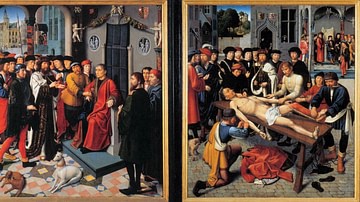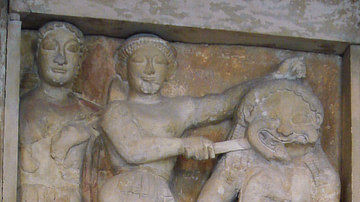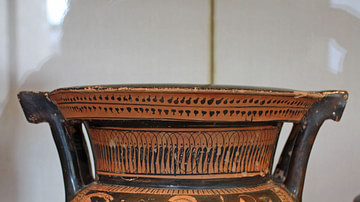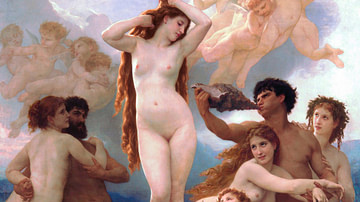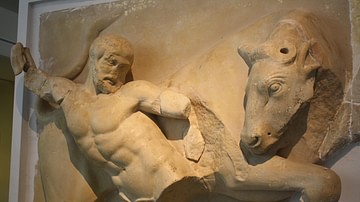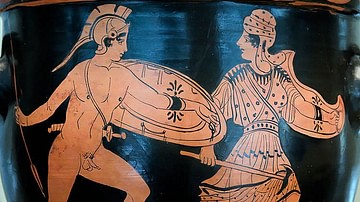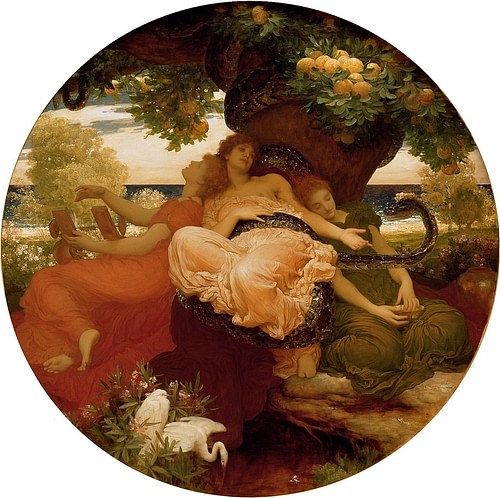
The Hesperides are nymph-goddesses of the evening and the west in Greek mythology. They were the daughters of Atlas, the Titan who bore the heavens on his shoulders, and Hesperis, the personification of the west, or Nyx, the personification of the night. Other stories list their parents as Phorcys, a sea god and the sea monster Ceto.
The Hesperides were known for their lush garden and for guarding Hera's apple tree, which grew golden apples that granted immortality. According to most traditions, there were three to seven Hesperides, with their names changing, depending on the source. Hesiod (c. 700 BCE) names them Aegle ("Brightness"), Erytheia, and Hesperethusa ("Sunset Glow"), while Apollonius of Rhodes (3rd century BCE) gives them the names Aegle, Erytheis ("Scarlet"), and Hespere. According to Apollodorus (180-120 BCE), they were called Aegle, Erythia, Hesperia, and Arethusa. Hesiod gives them the epithet "clear-voiced".
Birth & Family
Sources, including Pseudo-Hyginus (c. 64 BCE to c. 17 CE) and Diodorus Siculus (1st century BCE), state that the Hesperides were daughters of the Titan Atlas and Hesperia, the personification of the west. However, other sources, including Cicero (106-43 BCE), Pseudo-Apollodorus, and Hesiod in his Theogony, state that they were the daughters of Nyx (the personification of the night).
Again, although she slept with none of the gods,
Dark Night gave birth to Blame and sad Distress,
And the Hesperides, who, out beyond
The famous stream of Oceanus, tend
The lovely golden apples, and their trees.(Hesiod, Theogony, 214-218)
They are occasionally also named as the daughters of the sea god Phorcys and the sea monster Ceto.
The Garden of the Hesperides
The Garden of the Hesperides was the sacred garden and orchard of the goddess Hera. It was believed to exist close to the Atlas Mountain range (northwestern Africa). However, Apollonius of Rhodes placed the gardens near Lake Triton in Libya, while the Greek geographer Strabo (63 BCE to 23 CE) believed it was located in Tartessos (southern Spain). Some legends state that the garden's location needed to be moved further out into the western ocean as its location became common knowledge.
According to Greek author Scylax of Caryanda (c. 6th century BCE), the garden was surrounded by a high wall on all sides and was filled with different kinds of fruit trees. During antiquity, the garden was famous as the springs of nectar flowed, and the earth grew the rarest gifts from the gods. The Garden of Hesperides is often compared to the Garden of Eden.
The Hesperides were just one of many Greek deities that the ancient Greeks believed controlled nature. The Hesperides were a way for them to understand the sunset. They pictured each night sky as a garden that was usually hidden from human eyes, except for brief periods at night.
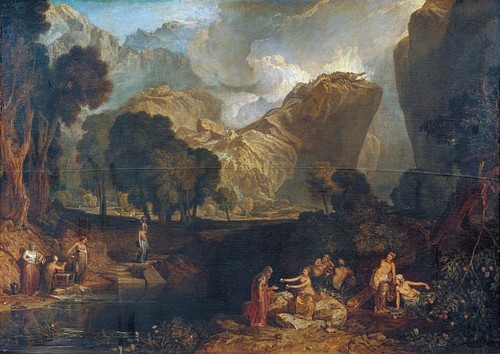
The Golden Apples
The concept of immortal apples is a common idea shared by some ancient cultures, especially the ancient Greeks and the ancient Norse. At Zeus and Hera's wedding, all the gods brought grand gifts. Mother Earth (Gaia) gave her grandchildren the greatest gift of all: a golden tree with golden apples which granted immortality to anyone who possessed them (some sources state that the golden tree was a gift from Zeus). Zeus and Hera were elated by this gift, and the Hesperides were tasked with guarding the apples for Hera. These golden apples were reportedly what gave the Olympian gods their immortality. The Hesperides wandered through the garden and sang to the tree.
The most famous story involving the golden apples is the one of Hercules (Herakles) and his twelve labours. After the legendary Greek hero Hercules had gone insane and killed his wife Megara and their children, he had gone searching for redemption. Hercules sought out the Oracle of Delphi, who advised him to travel to his cousin Eurystheus, the king of Tiryns and offer his services to him.
Hera, who resented Hercules, persuaded Eurystheus to set Hercules a series of dangerous and challenging tasks, and so began the Twelve Labours of Hercules. Hercules' eleventh labour was to retrieve the golden apples. The location of the Garden of the Hesperides was so well hidden that Hercules had to ask Nereus, the Old Man of the Sea, where it was located. After Hercules set Prometheus free, he offered to help Hercules in his quest for the apples. In one version of the myth, he suggested that Hercules get Atlas to retrieve the apples for him while he held the heavens up. Atlas fetched three apples from the Hesperides but was reluctant to return to his duty. So Hercules tricked him by asking him to hold the heavens while he found something to help ease the burden.
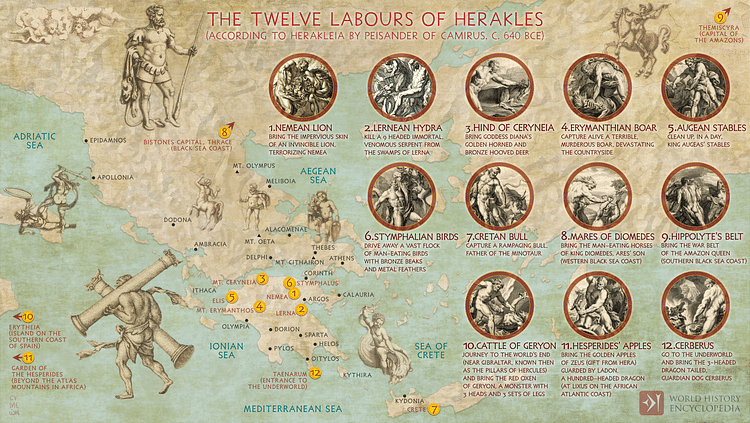
Another version of the story has Hercules facing and defeating Ladon, a fierce serpent belonging to Hera who had coiled himself around the golden tree. Ladon had replaced the Hesperides in guarding the tree, as the Hesperides had been unable to resist temptation and had picked and eaten the golden apples themselves. The apples were later fetched from Eurystheus and returned to the Hesperides by the kind Athena who felt sorry for them. Some sources state that after Hercules had completed his twelve labours, his horn was filled with golden fruit from the Hesperides and called the cornucopia (horn of plenty).
Eris, the goddess of discord and strife, was said to have retrieved her infamous Golden Apple of Discord from the Garden of the Hesperides. This apple was later used to stir up trouble at the wedding of King Peleus of Phthia and the sea nymph Thetis and was the catalyst for the events that led to the Trojan War.
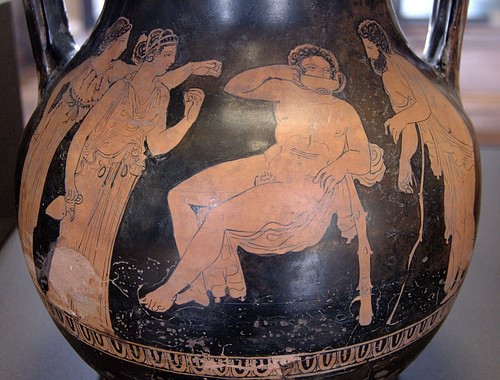
The huntress Atalanta was involved in another myth featuring three golden apples. Atalanta refused to marry anyone she could outrun in a foot race. However, a suitor named Melanion was determined to marry Atalanta. So he was given three golden apples by Aphrodite. During the race, he threw one of the apples ahead of Atalanta, and she stopped running to take a closer look, not being able to resist the beauty of the golden apple. He repeated the same action with the second and third apples and eventually won the race and Atalanta's hand in marriage.
The Hesperides & the Argonauts
In Book 4 of the Argonautica by Apollonius of Rhodes, the Greek hero Jason and the Argonauts are assisted in their quest to find the golden fleece by a strong cast of female figures, including the Hesperides. Jason and the Argonauts carried the Argo on their shoulders for twelve days and nights through the deserts of Libya. As they entered Lake Triton, they finally placed the ship down and rushed around in a mad thirst, trying to find a spring to drink from.
They reached the lovely garden of the Hesperides, where the Hesperides used to sing as they guarded the apples. There they found the serpent Ladon lying dead from Hercules' attack. The Hesperides lamented his death loudly, but as soon as the Argonauts approached, they went silent and vanished in a cloud of dust and earth. Orpheus, the gifted bard travelling with Jason and the Argonauts, invoked the Hesperides to win their favour.
O beautiful and kindly divinities, be gracious, powerful ones,
whether you are counted among the goddesses of heaven or of the
Underworld, or are called shepherd nymphs. Come, nymphs, sacred
offspring of Ocean, in answer to our need show yourselves clearly
to us, goddesses, and reveal some source of water in a rock or some
holy spring bubbling up from the earth, with which we may douse
the ceaseless fire of our thirst. If ever we sail back safe to the Achaian
land, then among the foremost goddesses we shall offer you in
gratitude countless gifts of libations and feasts.(Apollonius of Rhodes, Jason and the Golden Fleece (Argonautica), 4.1411-1420).
The Hesperides felt sorry for the tired and thirsty men and sent up trees from the ground. Hespere transformed into a poplar, Erytheis into an elm, and Aegle became the sacred trunk of a willow. They then transformed back into their usual appearance. Aegle told the men about Hercules' visit to their garden and his desperate thirst. She informed them that he had found a rock near Lake Triton, which he kicked, and caused a great stream of water to stream forth. After she had finished speaking, she pointed out the direction of this stream, and the Argonauts ran off in joy to find it and end their thirst.
The Hesperides & Perseus
In his quest to kill the Gorgon Medusa, the Greek hero Perseus sought the help of the Graeae (three elderly sisters who shared one eye and one tooth between them). He refused to give back their tooth and eye until they had given him valuable information. They told him to find the Garden of Hesperides, where he would find out where Medusa was located. Perseus travelled to the Garden of Hesperides, but the Hesperides refused to tell him the location of Medusa and instead instructed Perseus to ask Atlas.
Atlas ordered one of the Hesperides to go down to the underworld and retrieve the helmet of Hades, which would protect Perseus from Medusa's deadly stare. The Hesperides sent Perseus off with a mournful goodbye. After he had killed Medusa, Perseus returned to the Garden of the Hesperides, and the sisters were overjoyed to see that he was still alive.
Worship
In his Description of Greece, Pausanias (c. 115 to c. 180 CE) mentions that at the Temple of Zeus at Olympia, there were screens to keep the public away from Zeus' throne, and on these screens were paintings by Panaenus, brother of the famous Greek sculptor, Phidias. One of these paintings depicted two of the Hesperides holding apples. The Hesperides were removed from a treasury by the people of Olympia and moved to the Temple of Hera.
